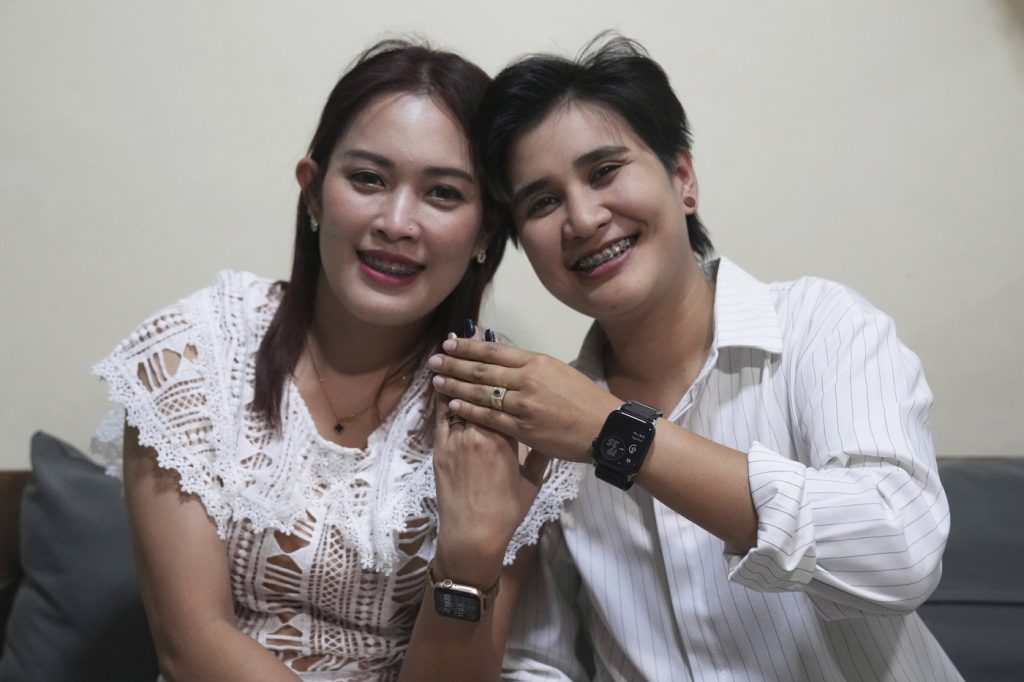BANGKOK (AP) — After being in a committed relationship for over 13 years and celebrating a wedding in 2019, Danaya Phonphayung and Sunma Piamboon, a same-sex couple, are eagerly anticipating the recognition of their marriage as a legal union. Despite not having legal acknowledgment until now, they have shared their lives as a couple, officially considering themselves married since their wedding ceremony in 2019. This Thursday marks a significant milestone as Thailand's new marriage equality law, which grants LGBTQ+ couples the same legal rights as heterosexual couples, comes into effect.
The couple resides in a suburban area of Bangkok, where their home is adorned with cherished photographs from their life together, a testament to their enduring love and the support of their families and friends. On the inaugural day of the law, Danaya and Sunma plan to register their marriage at a local district office, filled with excitement and anticipation. Danaya expressed her emotional readiness for the moment, stating, "I think I’ll cry," and shared her joy about this long-awaited day finally arriving.
Despite cohabiting, owning a house, and purchasing a car together, they felt the absence of legal rights that married couples enjoy. Danaya emphasized the urgency of securing their rights through legal marriage, mentioning, "When this is happening, we feel that it’s our rights that we need to secure as quickly as possible." Sunma, who runs a travel agency, highlighted the profound need for legal recognition when she faced challenges in making decisions during Danaya's hospitalization due to dengue fever, illustrating the practical importance of their relationship's legal recognition.
The marriage equality bill has traversed both the House of Representatives and the Senate with relative ease. It amends the Civil and Commercial Code, replacing "men and women" and "husband and wife" with more inclusive terms like "individuals" and "marriage partners." This legislative change is poised to endow LGBTQ+ couples with comprehensive legal, financial, and medical rights, which they have historically been denied.
While Thailand is known for its diverse norms and acceptance, it has wrestled with passing marriage equality laws due to prevailing conservative values within society. The government coalition led by the Pheu Thai party identified marriage equality as a primary objective, significantly engaging with events like the Bangkok Pride parade in June, which saw thousands of attendees celebrating LGBTQ+ rights. Recently, the Government House also hosted LGBTQ+ couples and activists to commemorate the impending law, showcasing the administration's commitment to LGBTQ+ rights, thereby making Thailand the first Southeast Asian country and the third in Asia—after Taiwan and Nepal—to adopt such legislation.
Prime Minister Paetongtarn Shinawatra addressed the gathering, expressing pride in the progress made, stating, "It is almost like a dream, but it’s not. So, congratulations to all." This acknowledgment signifies a crucial shift towards inclusivity in Thai policy. Organizers of Bangkok Pride collaborated with governmental agencies to celebrate the law's enactment with an anticipated grand event, where over 300 couples are set to officially register their marriages on the first day the law takes effect.
Ann “Waaddao” Chumaporn, a gender equality activist and lead organizer of Bangkok Pride, articulated the importance of the law, stating, "It’s about returning our dignity, confirming that we also have dignity as human beings." She expressed gratitude to all who have fought for this moment, emphasizing the significance of this day for countless couples who have long awaited legal recognition of their love.
In preparation for the implementation of the marriage equality law, the Bangkok Metropolitan Administration has organized workshops for staff at district offices responsible for marriage registration. These sessions are designed to raise awareness about gender diversity and equip officials with the necessary communication skills to support couples seeking to register their marriages.
Sanon Wangsrangboon, Bangkok Deputy Governor, reflected on the upcoming changes, noting the importance of broad societal acceptance and preparation among government officials. He acknowledged potential initial challenges but expressed hope for steady improvement as the community adapts to the new law.
Following the marriage registration, Sunma is eager to celebrate their union in a formal ceremony with their families, who have been supportive throughout their journey. "It's not just the two of us that are happy, but both of our families feel it is a big deal," she noted, illustrating the collective joy and anticipation surrounding this historic moment in Thai history.











